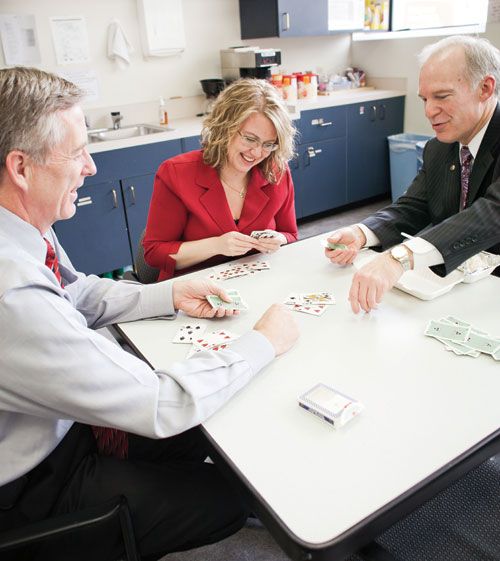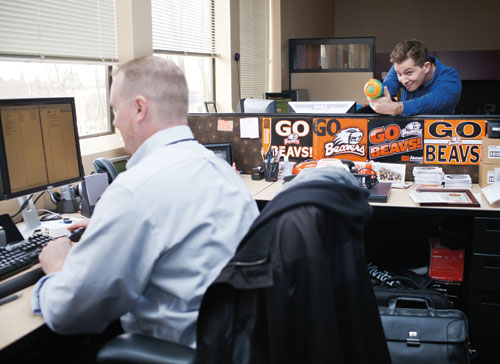 For 19 years, Oregon Business has been surveying employers statewide to find out just what it takes to be a great place to work. While it’s always a mix of factors that make some companies more attractive to employees than others, the tendency is often to highlight the more singular, tangible benefits such as massages and paid sabbaticals, lavish soirées and bring-your-pet-to-work days.
For 19 years, Oregon Business has been surveying employers statewide to find out just what it takes to be a great place to work. While it’s always a mix of factors that make some companies more attractive to employees than others, the tendency is often to highlight the more singular, tangible benefits such as massages and paid sabbaticals, lavish soirées and bring-your-pet-to-work days.
BY JON BELL
 |
At Pacific Continenetal Bank in Eugene, Mike Albin and Kloud Nickels find all work and no play is just not the way to keep the IT department humming.// Photo by Matthew D’Annunzio |
For 19 years, Oregon Business has been surveying employers statewide to find out just what it takes to be a great place to work. While it’s always a mix of factors that make some companies more attractive to employees than others, the tendency is often to highlight the more singular, tangible benefits such as massages and paid sabbaticals, lavish soirées and bring-your-pet-to-work days.
While we found plenty of those this year — worm composting bins and company Snuggies to name a few — what stands out even more this time around are benefits that aren’t as easy to define: the uniting influence of a mission, employee independence, executives playing on the same company volleyball team as day laborers.
Here’s a look at some of this year’s best companies to work for — and the mix of benefits that makes them so.
Pacific Continental Bank
From left: CEO Hal Brown, banking assistant Trina Marshall, and Mitch Hagstrom, president of the Greater Eugene market, take a card break. |
The company 401(k) match at Pacific Continental Bank is based on the bank’s annual return on investments. So, for example, if the bank realizes a 1% return, it matches contributions with a buck.
In 2009, the now 40-year-old bank actually experienced a small loss, so there was no match that year. But rather than accept an offer of a 50-cent match no matter the annual return, employees opted to be positive about the bank’s future.
“They said, ‘No, we want to be on the upside,’” says Hal Brown, CEO.
Pacific Continental has since rebounded, but Brown says the example typifies the commitment of the bank’s roughly 250 employees. Even more illustrative, he adds, is that 155 of those employees have been with Pacific Continental more than five years.
The bank doesn’t have massage tables for tellers or company beer nights; what it does have, according to Brown, is a culture of respect and appreciation for everyone. When someone asked him recently if he’d had to play his CEO card, Brown had to chuckle.
“I don’t think anybody plays the boss card here,” he says. “There is a mutual respect that just permeates the whole company.”
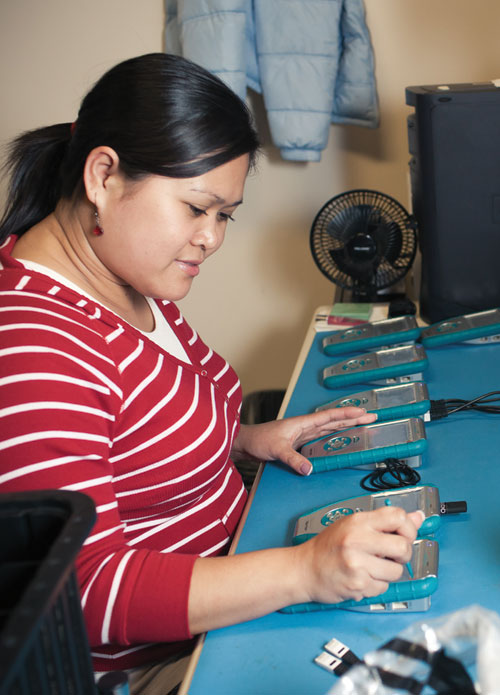 |
Above: Daria Luckman tests Vernier’s LabQuest Interface, one of the company’s data collection units.Below: The Vernier team gets in a bit of excercise and recreation together. (That’s the boss, David Vernier, in the blue T-shirt, at left.)// Photos by Matthew D’Annunzio |
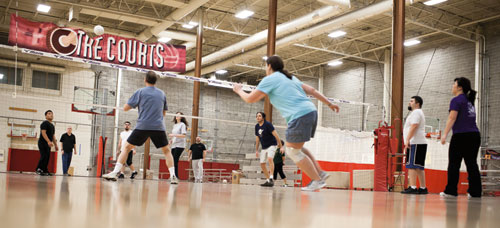 |
Vernier Software and Technology
The employee spectrum at this educational technology company spans from Ph.D. scientists to laborers who pack cardboard boxes — and everything in between.
But according to company president David Vernier, such distinctions mean very little, setting the tone for what it’s like to work at Vernier.
“One of our strong suits is that nobody’s better than anybody else,” says Vernier, a former high school science teacher who founded the company in 1981.
At Vernier, that means that everyone works — and plays — together. On top of a slew of traditional benefits, the company, which develops data collection software and sensors for use in classrooms, hosts frequent parties, weekly volleyball, soccer and basketball games, and occasional movie days. Employees also get access to Vernier’s Sunriver condo for three days every year.
The company focuses plenty on sustainability initiatives, from its LEED-certified building to a smattering of fruit trees and blueberry bushes planted out back.
Vernier says creating such a work environment helps foster a workforce that’s healthy, happy and in it for the long haul.
“We don’t lose a lot of people,” he says.
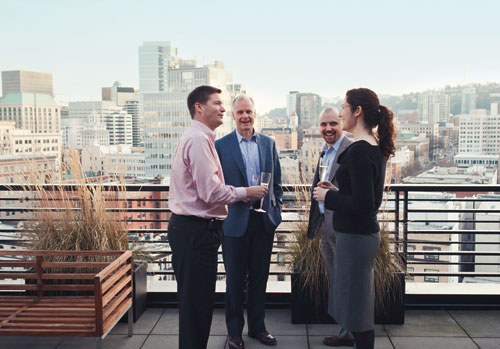 |
Above: Partners Brent Bullock and Doug Pahl party with colleagues Josh Lute and Dana Krawczuk on the firm’s rooftop.Below: The Perkins Coie team celebrates their Fortune ranking.// Photos by Matthew D’Annunzio |
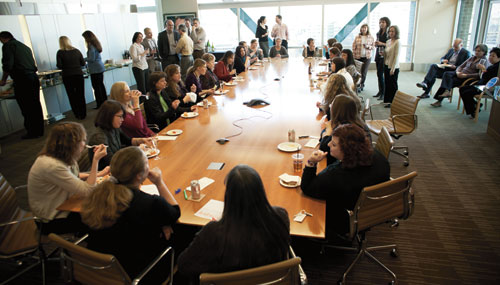 |
Perkins Coie LLP
The biggest factor making Perkins Coie LLP, a 100-year-old corporate law firm with 19 offices around the country, a great place to work is not its paid maternity and paternity leave, its $5,000 reimbursement for adoptions or its on-site gym. It is, according to Portland office managing partner Rob Aldisert, the firm’s clients.
“We have great clients,” says Aldisert, “and serving those clients as best we can is what we do.”
The 65 lawyers who work in the Portland office specialize in various markets, including corporate finance, bankruptcy, real estate, land use and environmental law. Aldisert says the firm cultivates a “collegial and collaborative” atmosphere among its attorneys that enables them to offer their clients the best service possible.
That commitment to collaboration and service has helped shape the actual culture of the company over the years.
“Everything that we do is focused on serving our clients well,” Aldisert says. “That culture is then reflected on everything that we do internally.”
Additionally, PC’s focus on diversity, from an office diversity committee to an annual minority law scholarship, adds to its workplace luster.
“The more you can incorporate diversity, the more complete — and better — you’ll be,” Aldisert says.
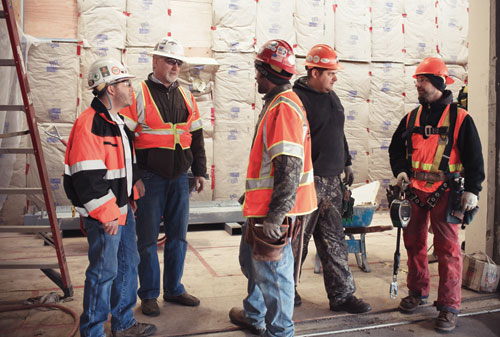 |
Above: Left to right: Bill Barnes, Art Bush, Rob Norton, John Chapman and Chris Hutchison work on the MAC Club project in Portland.Below: Dave Gusnul and Kelly Pyrch take a Ping Pong break.// Photos by Matthew D’Annunzio |
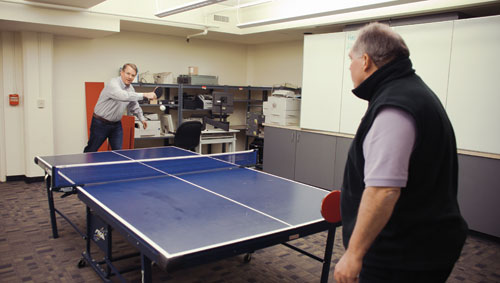 |
R&H Construction
John Bradley’s got a pretty simple standard for prospective employees of R&H Construction.
“You gotta be smarter than me,” says the CEO, who joined the commercial construction company in 1979. “That’s usually pretty clear in the first five minutes.”
Those who make the grade at R&H — there are almost 170 employees now — find themselves working for a company that takes care of them with more than solid benefits and summertime barbecues.
“We have a genuine respect for the time and talent of our people,” Bradley says, “which is in my mind the opposite of the ‘you’re lucky to have a job’ mentality.”
R&H, whose projects include all 10 New Seasons Markets, empowers its employees with a fair measure of responsibility and authority and expects them to adhere to the company’s code of ethics. The result, according to Bradley, is that employees feel valued and, in return, provide top-notch results.
“We just hope that everybody looks forward to coming to work,” Bradley says, “and that they look forward to leaving on time to go home.”
Lane Powell PC
Ask Lewis Horowitz, president of Lane Powell PC, about specific benefits the corporate law firm offers — discounted mortgages, ski passes, pet insurance — and you can almost hear his eyes roll.
“Most of those things are really just discounts you can secure by buying in bulk, so why wouldn’t we do it?” he says. “You don’t want to work for a firm just so you can get cheap health insurance for your dog.”
Instead, he says, if you take pay and benefits off the table, you’re left with the real attraction for working at Lane Powell.
“It’s the person sitting on either side of you,” Horowitz says. “We’ve got a spectacular group of people who want to work together for the benefit of our clients.”
Lane Powell serves a broad range of clients, from Fortune 500s to small businesses and individuals. Horowitz says that while the firm’s simple mission — helping clients — may not be the same as a nonprofit that feeds the poor, it’s nonetheless a mission that ties the staff and attorneys together.
“The culture is easy to maintain,” he says, “because most of us just want to earn a fair living, do the best we can and be a part of something that’s bigger and lasting.”
Employment Trends
For 15 of the 19 years that Oregon Business has been recognizing the best places to work, this Portland staffing company with 16 employees has been on the list.
President Tracie Basile-Cooper says a big part of that is simply that Employment Trends, which provides direct hire and temporary personnel in such fields as accounting, electronics and renewable energy, makes every effort to hire the best.
“The people who are providing our services truly care about making a great match,” she says. “They want to help companies be successful and help people find gainful employment.”
The company offers a raft of employee perks, from paid half-days off for birthdays to an eight-week paid sabbatical after seven years. But Basile-Cooper, who’s now in her 17th year with the company, says that the ways the company accommodates the personal lives of its employees — lots of hours for younger workers just starting out, more flexible schedules for employees starting families, for example — are likely the bigger draw.
“This is an organization that believes employment is a two-way street,” she says, “and we see each other through the different changes in our lives.”
Aim High Academy of Martial Arts
One of Daniel Sikkens’ 20 instructors at Aim High Academy of Martial Arts is also a stunt double for the filmed-in-Portland TV shows Grimm and Leverage. If ever that instructor gets a little too roughed up and needs a break, there’s always someone at Aim High who will gladly step up to fill the void.
“Everyone around here just works together all the time,” says Sikkens, executive director. “It’s like a family.”
A former Intel employee who founded Aim High in 2005, Sikkens has grown the academy into a large nonprofit teaching multiple martial arts disciplines to more than 500 students. He says the student-focused mentality and mission of the academy keeps all employees working together.
“There’s a lot of ego and pride in the martial arts industry,” says Sikkens. “We have some of that, but what really separates us is that we are 100% here for the students.”
Aim High makes a point to never turn a student away and to foster a welcoming, family atmosphere. Sikkens says that approach ends up bringing his employees that much closer together.
“We’re all very well bonded and work together as a family,” he says. “It’s the kind of approach that could work in anything. We could be selling donuts.”
Wieden+Kennedy
In its first season, the comedy show Portlandia did a little send-up of Portland ad agency Wieden+Kennedy, following star Carrie Brownstein through an over-the-top labyrinth of W+K office parties, air guitar sessions and disc-golf flings.
Though the show may have exaggerated the agency’s notoriously cool vibe a little much, managing director Tom Blessington says kegs on the rooftop, morning yoga classes and nap rooms are indeed part of the picture for W+K’s nearly 600 Portland employees. But rather than just simple perks, such accents actually serve to stimulate the creativity W+K thrives on.
“I think they’re emblematic of the chemistry and culture here,” says Blessington. “Around here, we are obsessed about creativity, and those kind of things just add substance to all that we espouse.”
Because W+K isn’t publicly held, as many similar-sized agencies are, Blessington says employees here aren’t beholden to shareholders — and they enjoy that independence. He compares the W+K workplace to a Montessori classroom, and says that working for well-known clients and brands like Nike and Old Spice is an alluring part of the job.
“While we take our work seriously,” he says, “we don’t take ourselves too seriously.”
Gorilla Capital
According to CEO John Helmick, more than half of Gorilla Capital’s 42 employees have purchased the company’s products for themselves. Considering that Gorilla buys distressed homes, remodels them and then puts them on the market, that’s no small commitment.
“That’s really encouraging to me, that the employees value our product, enough to buy them for themselves,” says Helmick, who founded Gorilla in 2006.
It’s also, to Helmick, just one of the many attractions that makes Gorilla a great place to work. The company, which has offices in six states, creates a homey, work-hard-play-hard environment at its headquarters, a 1912 craftsman house in Eugene. Employees enjoy snacks and lunches provided by the company, a healthy benefits package, annual team-building trips — this year’s is at Disneyland — and Gorilla-themed gear, from boxer shorts and slippers to water bottles and Snuggies.
Helmick says his employees tend to have an “agricultural work ethic” — when it’s time to work hard, they work hard. They also all have a voice at the company table, which has been part of Gorilla’s culture since day one.
“We realize we all have to trust one another and work hard together to be successful,” he says. “If we don’t do that, we’ll never get anything done.”

